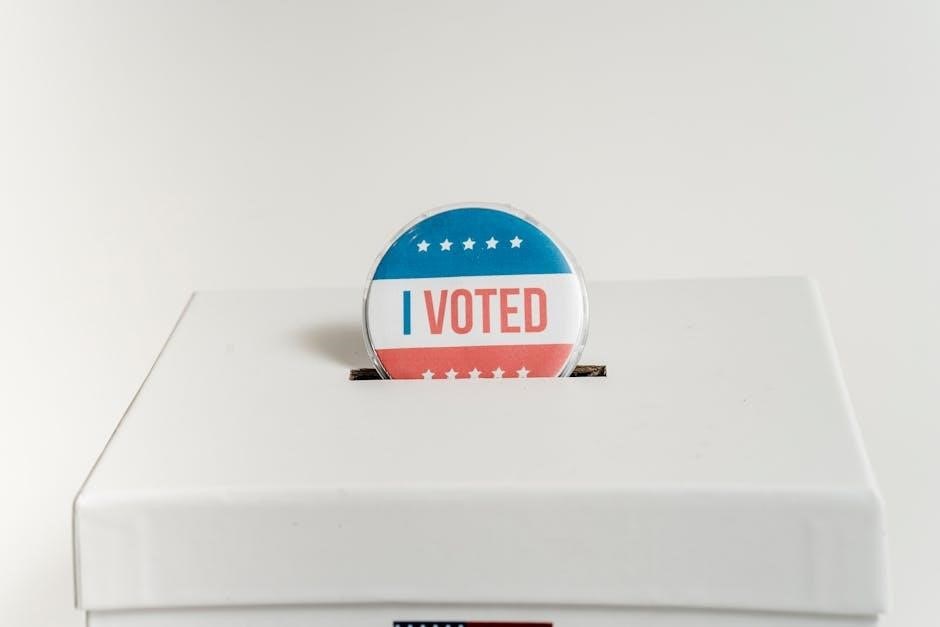united states government our democracy textbook pdf
1.1 Overview of the U.S. Political System
The U.S. political system is a representative democracy, operating under a constitutional framework that balances federal and state powers, ensuring accountability and citizen representation.
1.2 Key Principles of American Democracy
American democracy is rooted in principles like liberty, equality, and rule of law, fostering a system where citizens actively participate in shaping their governance and future.
The U.S. political system is a representative democracy, emphasizing elected officials who act on behalf of citizens. It operates under federalism, dividing power between federal and state governments. The system is characterized by three branches—legislative, executive, and judicial—designed to provide checks and balances. Citizens participate through elections and civic engagement, ensuring accountability and representation. This structure upholds key democratic principles like the rule of law and individual rights.
American democracy is founded on core principles such as liberty, equality, and the rule of law. It emphasizes popular sovereignty, where power resides with the people, and individual rights protected by the Constitution. These principles ensure accountability, justice, and opportunities for civic engagement, fostering a stable and fair society. They are essential for maintaining trust in government and upholding democratic values.

Structure of the U.S. Government
The U.S. government is divided into federal and state levels, with power distributed among the executive, legislative, and judicial branches. This structure ensures accountability and efficiency, as outlined in textbooks like United States Government: Our Democracy.
2.1 The Three Branches of Government: Legislative, Executive, and Judicial
The U.S. government is structured into three branches: Legislative, Executive, and Judicial. The Legislative branch, composed of Congress, creates laws. The Executive branch, led by the President, enforces laws. The Judicial branch, including the Supreme Court, interprets laws. This separation ensures checks and balances, preventing any branch from dominating. This framework is detailed in textbooks like United States Government: Our Democracy, which outlines the roles and functions of each branch.
2.2 Federalism: Division of Power Between Federal and State Governments
Federalism divides power between the federal government and state governments, ensuring a balance of authority. The federal government oversees national matters like defense and foreign policy, while states manage local issues such as education and transportation. This division, outlined in the United States Government: Our Democracy textbook, promotes regional autonomy while maintaining national unity, allowing both levels to address specific needs effectively.

Democratic Processes and Participation
Democratic processes in the U.S. involve free elections, voting rights, and civic engagement, enabling citizens to influence governance and hold leaders accountable, as detailed in the textbook.
3.1 Elections and Voting Rights in the United States
Elections in the U.S. are conducted through the Electoral College system, ensuring representation across states. The 26th Amendment expanded voting rights to citizens aged 18 and older, while the Voting Rights Act of 1965 aimed to eliminate racial discrimination in voting. Challenges such as voter ID laws and gerrymandering continue to impact access to the ballot box, as discussed in the “Our Democracy” textbook.
3.2 Role of Political Parties in American Democracy
Political parties play a crucial role in shaping policy agendas and supporting candidates. They influence public opinion, finance campaigns, and connect citizens to the political process. The two-party system dominates U.S. politics, with Democrats and Republicans often polarizing issues. Their role in elections, nominations, and governance underscores their significance in American democracy, as explored in the “Our Democracy” textbook, highlighting their impact on political outcomes and national direction.

The Role of the Citizen in American Democracy
Citizens play a vital role in American democracy by engaging in civic activities, such as voting and advocating for policies. Their active participation ensures accountability and shapes the direction of governance, fostering a responsive and inclusive political system.
4.1 Civic Engagement and Responsibilities of Citizens
Civic engagement is a cornerstone of American democracy, requiring citizens to actively participate in shaping their governance. Key responsibilities include voting, jury duty, and community involvement. By staying informed and advocating for policies, citizens ensure accountability and contribute to the nation’s progress. Their involvement strengthens democratic institutions and fosters a society rooted in shared values and collective action.
- Voting in elections ensures representation of public interests.
- Community participation enhances local decision-making processes.
- Advocacy for policies promotes equity and justice.
4.2 The Importance of Civil Liberties and Rights
Civil liberties and rights are fundamental to American democracy, ensuring individual freedoms and protecting citizens from government overreach. These rights, enshrined in the Constitution, include freedom of speech, religion, and assembly. They safeguard personal autonomy and promote a fair and just society, enabling citizens to hold the government accountable and participate meaningfully in the democratic process.
- Protect individual freedoms and dignity.
- Ensure equality and justice under the law.
- Enable citizens to challenge governmental authority.

Challenges to American Democracy
American democracy faces challenges such as political polarization, misinformation, and declining trust in institutions, which threaten its stability and effectiveness in representing the people’s interests.
- Political polarization and partisanship.
- Misinformation and disinformation.
- Declining public trust in government.
5.1 Current Issues Facing the U.S. Government and Democracy
The U.S. government and democracy face significant challenges, including political polarization, misinformation, and declining trust in institutions. These issues undermine public confidence and effective governance.
- Political polarization and partisanship hinder bipartisan cooperation.
- Misinformation and disinformation erode trust in democratic processes.
- Financial influences and electoral integrity concerns persist.
- Recent reports highlight a decline in the U.S. democratic ranking globally.
5.2 Criticisms of the U.S. Democratic System
The U.S. democratic system faces criticism for issues like money in politics, gerrymandering, and voter suppression, which undermine fairness and representation. The electoral college system and filibuster are also contentious, as they can disproportionately favor certain groups over others, leading to calls for reform to ensure greater equality and representation for all citizens.
- Critics argue that campaign finance laws favor wealthy donors.
- Gerrymandering distorts electoral districts, impacting representation.
- Voter suppression tactics limit access to polls for marginalized communities.
The United States Government: Our Democracy Textbook
The textbook provides a comprehensive overview of the U.S. government, covering its structure, functions, and key democratic principles, designed to help students understand American democracy effectively.
6;1 Overview of the Textbook and Its Content
United States Government: Our Democracy is a comprehensive textbook designed for high school students. It explores the structure, functions, and principles of the U.S. government, including the three branches, federalism, democratic processes, and civil liberties. The textbook emphasizes critical thinking and civic engagement, offering insights into historical developments and contemporary challenges. Available in PDF, it serves as a valuable resource for understanding American democracy.
6.2 Key Features of the Textbook for Students
The textbook United States Government: Our Democracy offers a comprehensive understanding of American governance; It features a clear structure, real-world examples, and interactive elements to engage students. Available in PDF format, it ensures accessibility and convenience for digital learners. The content aligns with curriculum standards, providing a robust foundation for civic education and fostering critical thinking about democracy and its practices.

The Rule of Law and Its Impact on Democracy
The rule of law is a cornerstone of American democracy, ensuring accountability, fairness, and equality. It protects citizens’ rights and binds both institutions and individuals to legal principles, fostering stability and legitimacy in the democratic system.
7.1 The Doctrine of the Rule of Law in the U.S.
The rule of law in the U.S. is a foundational doctrine ensuring that all actions, governmental and individual, align with established legal principles. It promotes fairness, accountability, and equality, safeguarding citizens’ rights while maintaining social order. This doctrine is central to American democracy, guaranteeing that no one is above the law and that justice is applied uniformly across society.
7.2 How the Rule of Law Shapes Government and Society
The rule of law ensures accountability and fairness, shaping government by establishing checks and balances and preventing abuse of power. In society, it fosters trust, stability, and economic growth by providing a predictable legal framework. This principle protects individual rights, promotes justice, and maintains order, making it a cornerstone of American democracy and governance.
The Character of American Democracy
American democracy’s character is defined by its representative system and constitutional framework, balancing power while ensuring stability and progress. These principles safeguard freedom and justice, embodying the nation’s democratic essence.
8.1 Historical Development of American Democratic Institutions
The development of American democratic institutions traces back to the Founding Fathers, who established a constitutional framework emphasizing checks and balances. Over time, the system evolved through key milestones like the Bill of Rights, Civil War amendments, and civil rights legislation, shaping a unique democratic model centered on representative governance and individual freedoms.
8.2 Unique Features of the U.S. Democratic System
The U.S. democratic system is distinguished by its separation of powers, federalism, and the Electoral College. Civil liberties, protected by the Constitution, and judicial review further enhance its uniqueness. These features ensure a balance of power and safeguard individual freedoms, creating a governance model that stands out among other democratic systems worldwide.
The Role of the Media in American Democracy
The media plays a crucial role in shaping public opinion and holding power accountable, acting as a watchdog to ensure transparency and inform citizens about government actions.
9.1 The Media’s Influence on Public Opinion and Policy
The media significantly influences public opinion and policy in American democracy by disseminating information, shaping perceptions, and highlighting key issues. Through various platforms, it affects how citizens view policies and political campaigns, thereby influencing decision-making processes and policy formulation.
9.2 Challenges Facing the Media in a Democratic Society
The media faces challenges such as misinformation, bias, and declining public trust, which can undermine its role in a democratic society. The rise of social media has accelerated the spread of disinformation, while political polarization exacerbates bias in reporting. Additionally, the 24-hour news cycle often prioritizes sensationalism over factual accuracy, further eroding trust in media institutions.
Education and Understanding of American Government
The textbook United States Government: Our Democracy provides a comprehensive resource for students to grasp the structure, functions, and principles of American government, fostering civic literacy.
10.1 The Importance of Civic Education in the U.S.
Civic education is crucial for fostering informed citizens who actively engage in democracy. It equips students with the knowledge and skills to understand their rights and roles within the U.S. political system. Textbooks like United States Government: Our Democracy provide structured learning materials, ensuring students grasp foundational principles such as federalism, the rule of law, and democratic participation.
10.2 Resources for Learning About American Government
The United States Government: Our Democracy textbook is a comprehensive resource for understanding American governance. Available in PDF format, it offers insights into the U.S. political system, federalism, and democratic processes. Digital resources enhance accessibility, allowing students to explore topics like civic education and the rule of law efficiently, ensuring a well-rounded understanding of American democracy.
Global Perspectives on American Democracy
The U.S. democratic system is often studied globally as a model of representative democracy, with its unique features like federalism and checks and balances.
11.1 Comparisons with Other Democratic Systems
The U.S. democratic system is often compared to other nations, highlighting its unique federal structure and constitutional framework. Unlike parliamentary systems, the U.S. separates executive and legislative powers, ensuring checks and balances. While other democracies emphasize proportional representation, the U.S. relies on a winner-takes-all approach, which can lead to divided governments. Global perspectives often critique the U.S. system for its complexity and potential inefficiencies, yet it remains a model for its enduring stability and innovation in governance.
11.2 International Views on the U.S. Government and Democracy
International perspectives on U.S. democracy vary widely, with some viewing it as a beacon of freedom and others critiquing its shortcomings, such as political polarization. Globally, the U.S. system is often seen as influential yet flawed, with concerns about voter access and campaign finance. Its unique blend of federalism and constitutional checks and balances is both admired and scrutinized on the world stage.
The Future of American Democracy
The future of American democracy faces challenges like polarization and voter access, but opportunities for reform and civic engagement offer pathways to strengthen democratic institutions.
12.1 Emerging Trends and Challenges
American democracy faces emerging trends such as increasing polarization, voter access challenges, and the rise of misinformation. These issues threaten democratic stability, requiring innovative solutions. Civic engagement and digital tools offer opportunities for reform, fostering greater participation and transparency. The role of education, as highlighted in the United States Government: Our Democracy textbook, remains critical in addressing these challenges.
12.2 Opportunities for Reform and Improvement
Reforms such as campaign finance overhaul and voter access expansion can strengthen democracy. Enhancing civic education and media literacy are vital to combating misinformation. Modernizing electoral systems and fostering bipartisan collaboration can address polarization. Investments in digital tools and transparent governance can rebuild trust, ensuring a resilient democratic future as highlighted in the United States Government: Our Democracy textbook.

Textbook Availability and Access
The textbook is easily available in PDF format online, accessible through platforms like McGraw Hill, offering convenient study options for students of American government and democracy.
13.1 How to Obtain the Textbook in PDF Format
To obtain the United States Government: Our Democracy textbook in PDF format, visit the McGraw Hill website or authorized online retailers like Amazon. Search for the ISBN 9780076681136 to ensure authenticity. Additionally, educational platforms and digital libraries may offer access to the PDF version for convenient studying and reference. Always verify the source for copyright compliance.
13.2 Benefits of Using Digital Resources for Study
Using digital resources like the United States Government: Our Democracy textbook in PDF offers convenience, accessibility, and flexibility. Students can easily search, highlight, and annotate content, enhancing study efficiency. Digital formats also reduce clutter, allow instant access, and often include interactive features; Additionally, they support environmental sustainability by minimizing paper use, making them a practical choice for modern learners.
The United States Government: Our Democracy textbook provides a comprehensive understanding of American governance, emphasizing the importance of democratic principles and citizen engagement for a functioning society.
14.1 Summary of Key Concepts
The United States Government: Our Democracy textbook explores the foundational principles of American democracy, including federalism, the rule of law, and civic engagement. It examines the structure of the U.S. government, the role of political parties, and the importance of civil liberties. The text also addresses contemporary challenges and the significance of understanding democratic institutions for active citizenship and societal progress.
14.2 Final Thoughts on the Importance of Understanding American Democracy
Understanding American democracy is crucial for fostering informed citizenship and preserving freedom. By studying the U.S. government’s structure, functions, and challenges, individuals gain the knowledge to participate actively in civic life; This understanding not only strengthens democratic institutions but also empowers citizens to address societal issues and promote justice, ensuring the continued vitality of American democracy for future generations.
